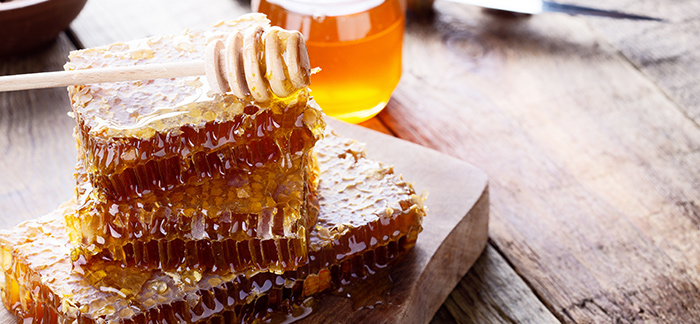HONEY: 8 shocking and interesting benefits found in honey, check!

Raw honey has historically been known to heal wounds, help digestion, and soothe a sore throat. Aside from being delicious, there are other ways raw honey is good for you. Raw has been used as a remedy throughout history and has a variety of health benefits and medical uses.
HONEY It’s even used in some hospitals as a treatment for wounds. Many of these health benefits are specific to raw, or unpasteurized, Most of the it you find in grocery stores is pasteurized. The high heat kills unwanted yeast, can improve the color and texture, removes any crystallization, and extends the shelf life. However, many of the beneficial nutrients are also destroyed in the process.
If you’re interested in trying raw honey, you might consider buying it from a trusted local producer. Here are some health benefits raw has to offer: A good source of antioxidants Raw contains an array of plant chemicals that act as antioxidants.

Some types of honey have as many antioxidants as fruits and vegetables. Antioxidants help to protect your body from cell damage due to free radicals. Raw has been used as a natural remedy for centuries, with historical records dating back to ancient civilizations like Egypt, Greece, and China.
This golden elixir has been revered for its exceptional healing properties, versatility, and health benefits. Aside from being a delectable treat, honey is a veritable powerhouse of beneficial nutrients and compounds. Unlike the pasteurized found in most commercial grocery stores, raw honey retains its full spectrum of natural goodness.
Table of Contents
The process of pasteurization, which involves subjecting the honey to high heat, may extend its shelf life and improve its appearance, but at the cost of many of its essential nutrients and enzymes. In contrast, raw remains in its unprocessed state, preserving a wide array of beneficial plant chemicals, antioxidants, and other compounds that are lost during pasteurization.
One of the most notable health benefits of raw honey is its remarkable ability to support the immune system and protect the body from oxidative stress. is brimming with an array of potent antioxidants, including flavonoids and phenolic acids, which can help neutralize free radicals and prevent cellular damage.
In fact, some varieties of raw honey contain antioxidant levels that rival those found in fruits and vegetables. Beyond its antioxidant prowess, raw has also been traditionally used to soothe sore throats, aid digestion, and even promote wound healing. Its antibacterial and anti-inflammatory properties make it an effective natural remedy for a variety of ailments.

Interestingly, raw honey is even used in some hospital settings as a topical treatment for wounds, owing to its ability to create a protective barrier and promote the healing process. If you’re interested in experiencing the full range of benefits that raw has to offer, consider seeking out a trusted local producer or beekeeper.
With its rich,
complex flavor and an abundance of beneficial nutrients, raw honey is a truly exceptional natural treasure that deserves a place in your wellness routine. Heart disease is one of the leading causes of mortality worldwide, and research has shown that taking preventive measures can significantly reduce the risk.
One such promising approach is the consumption of raw honey, which contains a variety of antioxidant compounds called polyphenols. These polyphenols have been found to exhibit anti-inflammatory effects that could be beneficial in protecting against a number of conditions associated with oxidative stress, including cardiovascular disease.
In addition to the polyphenols, raw can also contain other beneficial compounds such as bee pollen and bee propolis. A comprehensive review of studies has suggested that raw honey may have potential protective effects on various bodily systems, including the respiratory, gastrointestinal, cardiovascular, and nervous systems. Interestingly, the review also indicated that raw may have potential applications in cancer treatment, though further research is needed to fully understand its therapeutic implications.
The nutritional profile of raw honey is quite diverse and can vary depending on its geographic origin and other factors. Typically, a single tablespoon (21 grams) of raw honey contains 64 calories and 17 grams of sugar. However, it also provides smaller amounts of essential micronutrients, such as calcium, magnesium, manganese, niacin, pantothenic acid, phosphorus, potassium, riboflavin, and zinc. Additionally, raw is a source of various amino acids, enzymes, and other beneficial compounds, further contributing to its potential health benefits.
One of the most notable properties of raw is its antibacterial and antifungal capabilities. Research has shown that the propolis present in raw has potent antifungal and antibacterial properties, which can be particularly useful in the treatment of certain infections. The effectiveness of honey as an antimicrobial agent can vary depending on the specific variety, but some types are being actively studied for their potential therapeutic applications, such as against Candida-associated infections.
The versatility of raw honey in terms of both internal and topical treatments is quite significant. Its antibacterial and antifungal properties make it a promising candidate for a wide range of medical and cosmetic applications, from wound healing to skin care. Furthermore, the potential of raw in supporting overall health and well-being, particularly through its anti-inflammatory and antioxidant effects, is an area of ongoing research and exploration.
Honey used in research settings is specially prepared and certified as medical grade. This means it has undergone rigorous inspection and sterilization processes to ensure it meets strict purity and safety standards. The raw is meticulously filtered and treated to remove any potential contaminants or impurities, making it suitable for use in medical and clinical applications. In contrast, the raw you can purchase from a regular grocery store or supermarket is not typically medical grade.
While store-bought is generally safe for consumption, it has not gone through the same level of inspection and treatment as the honey used in research and medical settings. There may be variations in the purity, cleanliness, and sterility of store-bought, depending on the source and processing methods used by the manufacturer.
It is important to note that using store-bought to treat cuts or wounds can be risky, as it may contain various microorganisms, spores, or other substances that could potentially cause infections or complications. The medical-grade used in research and clinical settings is specifically designed and prepared to be safe and effective for wound care and other medical applications.
Therefore, it is generally not recommended to use regular store-bought honey for treating cuts, wounds, or any other medical purposes. It is always best to consult with a healthcare professional and use the appropriate, medically-approved products for wound care and other medical treatments.
Help for Digestive Issues
Honey has long been touted as a natural remedy for various digestive problems, and scientific research is beginning to shed light on its potential benefits. While the evidence is still limited, some studies suggest that honey may be effective in treating certain digestive issues. One area where honey shows promise is in the treatment of diarrhea.
Diarrhea can be caused by a variety of factors, including bacterial infections, viral illnesses, and dietary changes. Honey’s antimicrobial properties may help to inhibit the growth of harmful bacteria in the gut, potentially alleviating diarrheal symptoms. Additionally, honey’s soothing and coating properties may help to calm the irritated digestive tract, providing relief.
Another area where honey may be beneficial is in the treatment of Helicobacter pylori (H. pylori) infections, a common cause of stomach ulcers. Some studies have suggested that honey may have inhibitory effects on H. pylori, potentially offering a natural alternative to traditional antibiotic treatments.
The exact mechanisms behind this effect are still being explored, but it is thought that honey’s antimicrobial and anti-inflammatory properties may play a role. Honey also contains beneficial prebiotics, which are substances that nourish the “good” bacteria in the intestines.
These gut-friendly microorganisms are crucial not only for digestion but for overall health, as they play a key role in immune function, nutrient absorption, and even mental well-being. By promoting the growth of these beneficial bacteria, honey may help to maintain a healthy gut microbiome, supporting optimal digestive function.
Soothe a Sore Throat and Cough
In addition to its potential digestive benefits, raw has long been used as a natural remedy for sore throats and coughs. The soothing and coating properties of honey can help to alleviate the discomfort and irritation associated with these upper respiratory tract infections. Recent research has further bolstered the use of honey as a sore throat and cough treatment.
A 2021 review of studies suggested that honey may be superior to other forms of care, such as over-the-counter medications, in improving the symptoms of upper respiratory tract infections. The authors attributed this to honey’s antimicrobial, anti-inflammatory, and wound-healing properties, which can help to reduce inflammation and promote healing in the affected areas. A 2016 study also supported the use of it for sore throat relief, finding that its antibacterial and anti-inflammatory effects were effective in helping to soothe the discomfort.

The study’s authors noted that honey’s ability to coat and lubricate the throat, as well as its potential to reduce swelling, contributed to its effectiveness as a natural sore throat remedy.
Brain Benefits
Interestingly, honey may also offer some cognitive benefits. The polyphenols present in raw, unprocessed honey have been shown to have anti-inflammatory properties, and research suggests that these compounds may be able to counteract inflammation in the hippocampus, the part of the brain responsible for memory formation and recall.
The antioxidant and anti-inflammatory effects of honey have the potential to benefit many other aspects of brain health as well. By reducing inflammation and oxidative stress, raw may help to protect the brain from the damaging effects of these processes, which have been linked to various neurological conditions and cognitive decline.
Overall, the versatility of honey as a natural remedy is quite remarkable. From its potential to support digestive health and soothe respiratory ailments to its possible cognitive benefits, this golden liquid continues to showcase its remarkable therapeutic potential.





